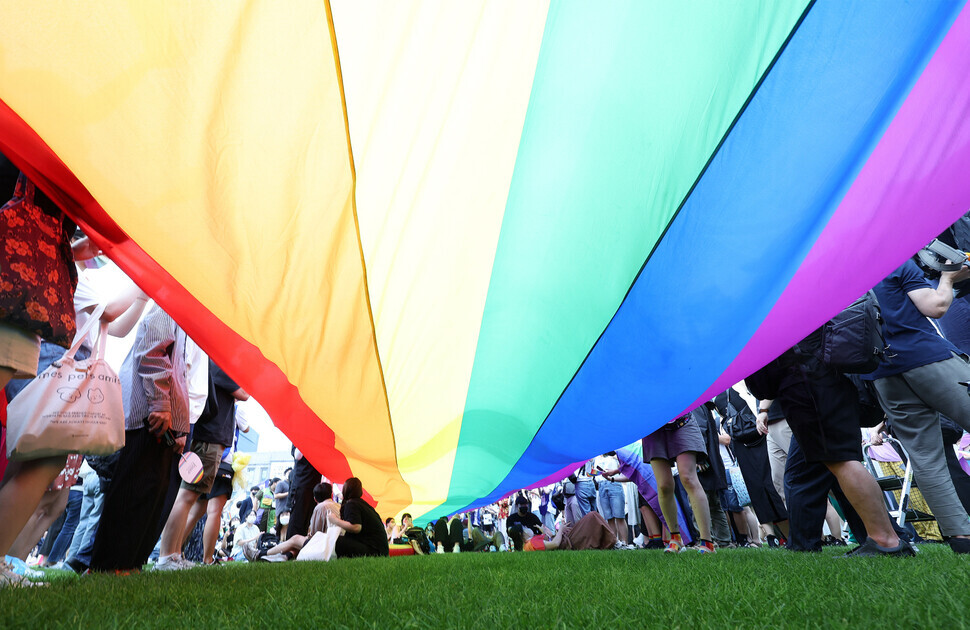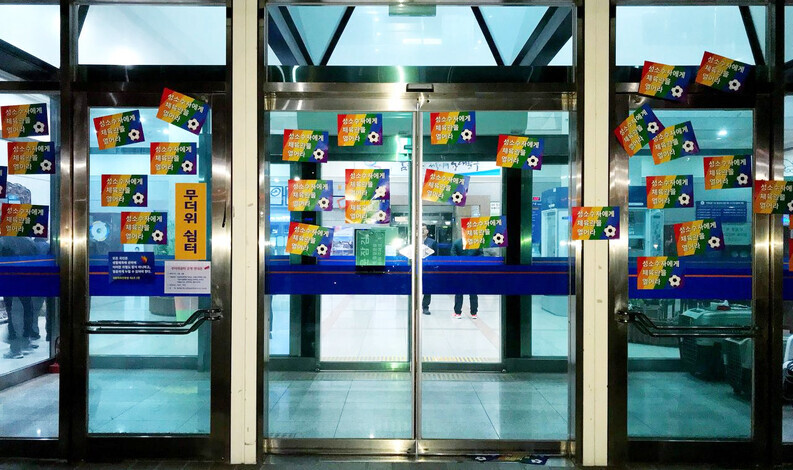hankyoreh
Links to other country sites 다른 나라 사이트 링크
S. Korean Supreme Court delivers landmark ruling on sexual orientation-based discrimination

The Supreme Court of South Korea has ruled that a Seoul district and facilities management corporation must pay compensation for damages for committing “discriminatory acts based on sexual orientation” after canceling a queer women’s organization’s rental of a public gymnasium.
According to Hankyoreh coverage on Wednesday, after the organization Unni Network (affiliated with QueerWomen) and four activists filed a lawsuit against Dongdaemun District and the Dongdaemun District Facilities Management Corporation, the Supreme Court upheld the judgment of a previous lower court ruling in favor of the plaintiffs by deciding to discontinue a trial on Aug. 19.
The decision to discontinue a trial is a method in which the Supreme Court rejects an original appeal without a hearing unless there is a special reason, such as a serious violation of the law in the lower court, thus upholding the original trial ruling.
Five years ago, QueerWomen rented a gymnasium in Dongdaemun District to hold a “Queer Women’s Sports Day” event on Oct. 21, 2017.
However, when complaints from locals started pouring in due to it being an event for and by sexual minorities, the Dongdaemun District Facilities Management Corporation decided to cancel the rental on Sept. 26, about a month before the event. The reason they gave was that the ceiling of the gymnasium needed to undergo construction work.
In the process, an official from the facilities management corporation even reportedly told the group that their event could “harm public morals.”
In response, Unni Network and activists said that the cancellation of the rental was “based on the purpose of the sports competition and the sexual orientation of the participants,” adding that the cancellation was “illegal as it constitutes discrimination based on sexual orientation."
The queer women’s group also said that the cancelation of the permission to rent the facility “violated the activists’ right to equality and freedom of assembly” and subsequently filed a lawsuit for damages in January of 2020.

In the first trial, the court stated that, although the cancellation of the rental agreement was illegal, it did not result in direct damage to the plaintiffs. The second trial, however, did accept most of the arguments made by the plaintiffs.
In May, the appellate court took into account the fact that the facilities management corporation received complaints immediately after renting the gymnasium to the queer women’s group and also that there was no urgent reason to do construction work in the gymnasium at the time.
Accordingly, the court stated that the “cancellation of the rental permit is a discriminatory act based on sexual orientation, and it is not only discrimination against the Unni Network, but also discrimination against the hosts, organizers, and expected participants of the sports competition.”
The court concluded that “the cancellation of the rental permit violated both the rights to equality of the organization and the activists,” acknowledging the corporation’s responsibility for damages.
The compensation for damages totaled 9 million won (US$6,730), which included 5 million won for the queer women’s organization and 1 million won for each activist. The compensation was awarded due to how the corporation canceled the rental permit, stated a false reason for the cancellation, and also because of the need to prevent discrimination.
Park Han-hee, a lawyer involved in the lawsuit, said the suit was meant “to raise awareness of the discrimination against sexual minorities in public institutions, which is so prevalent in Korean society.”
“After a long trial, we finally received a meaningful ruling by the Supreme Court,” Park said, “and we will continue to fight against discrimination and achieve equality in all areas.”
By Shin Min-jung, staff reporter
Please direct questions or comments to [english@hani.co.kr]

Editorial・opinion
![[Guest essay] The real reason Korea’s new right wants to dub Rhee a founding father [Guest essay] The real reason Korea’s new right wants to dub Rhee a founding father](https://flexible.img.hani.co.kr/flexible/normal/500/300/imgdb/original/2024/0423/8317138574257878.jpg) [Guest essay] The real reason Korea’s new right wants to dub Rhee a founding father
[Guest essay] The real reason Korea’s new right wants to dub Rhee a founding father![[Column] ‘Choson’: Is it time we start referring to N. Korea in its own terms? [Column] ‘Choson’: Is it time we start referring to N. Korea in its own terms?](https://flexible.img.hani.co.kr/flexible/normal/500/300/imgdb/original/2024/0423/3617138579390322.jpg) [Column] ‘Choson’: Is it time we start referring to N. Korea in its own terms?
[Column] ‘Choson’: Is it time we start referring to N. Korea in its own terms?- [Editorial] Japan’s rewriting of history with Korea has gone too far
- [Column] The president’s questionable capacity for dialogue
- [Column] Are chaebol firms just pizza pies for families to divvy up as they please?
- [Column] Has Korea, too, crossed the Rubicon on China?
- [Correspondent’s column] In Japan’s alliance with US, echoes of its past alliances with UK
- [Editorial] Does Yoon think the Korean public is wrong?
- [Editorial] As it bolsters its alliance with US, Japan must be accountable for past
- [Guest essay] Amending the Constitution is Yoon’s key to leaving office in public’s good graces
Most viewed articles
- 1[Guest essay] The real reason Korea’s new right wants to dub Rhee a founding father
- 2Terry Anderson, AP reporter who informed world of massacre in Gwangju, dies at 76
- 3[Column] ‘Choson’: Is it time we start referring to N. Korea in its own terms?
- 4Why Korea shouldn’t welcome Japan’s newly beefed up defense cooperation with US
- 5Opposition calls Yoon’s chief of staff appointment a ‘slap in the face’
- 6[Column] The clock is ticking for Korea’s first lady
- 7Senior doctors cut hours, prepare to resign as government refuses to scrap medical reform plan
- 8New AI-based translation tools make their way into everyday life in Korea
- 9[Editorial] Japan’s rewriting of history with Korea has gone too far
- 10[Column] Are chaebol firms just pizza pies for families to divvy up as they please?